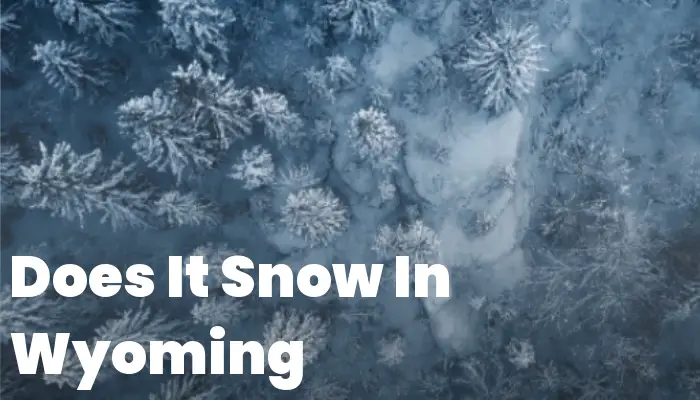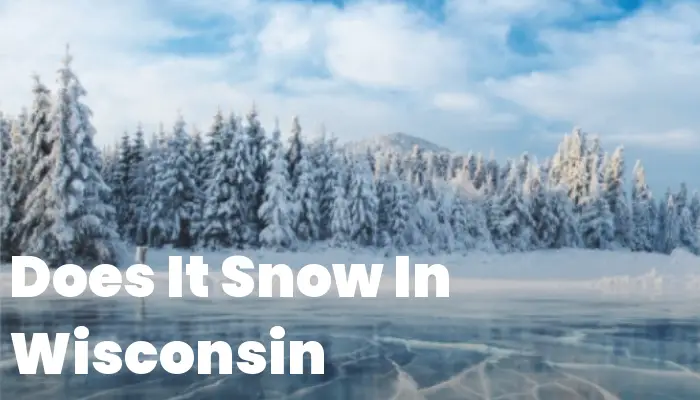Are you planning a trip to the picturesque city of New Haven, Connecticut and wondering about the weather conditions? Specifically, does it snow in New Haven, Connecticut? In this article, we will delve into the seasonal changes in this city. We’ll explore everything from its chilly winters kissed with flurries of snow to its warm summers.
So whether you are a fan of the snow-capped landscapes or prefer basking in the summer sun, we got you covered. Stay tuned for an all-inclusive guide on New Haven’s climate!
Does It Snow In New Haven Connecticut?
Yes, it does snow in New Haven, Connecticut. This picturesque city experiences the full swing of all four seasons, including a winter that invites both gentle snowfalls and robust snowstorms. As part of the northeast United States, which is well-known for its cold and snowy winters, New Haven is no stranger to the serene beauty of a fresh blanket of snow.
The winter season generally sets in by late November and stretches through to early March. During this period, residents and visitors alike can expect to see varying amounts of snowfall. If you’re planning a visit during winter, it’s wise to pack warm clothing such as coats, hats, gloves, and boots to navigate through the potentially snowy streets with ease.
Snow in New Haven comes with its own charm, dressing up Yale University’s historic campus and the various public parks throughout the city with a picturesque layer of white. But it’s not just about aesthetics; snow also has implications for day-to-day activities including travel disruptions—something worth considering when planning your itinerary.
How Much Does It Snow In New Haven Connecticut?
Snowfall in New Haven can vary from year to year but on average you can expect moderate to heavy accumulations depending on prevailing weather patterns. The city sees an average annual snowfall of approximately 30 inches. However, this number fluctuates; some years may bring lighter dustings whereas others witness significant blizzards that stack up several inches within hours.
Typically, January is considered the peak month for snowfall in New Haven. It’s common during this time for multiple storms to occur that can quickly accumulate substantial depths of snow. Furthermore,outlying suburban areas might experience slightly different conditions compared to what is recorded within city limits due to topographical influences on weather systems.
Those interested in outdoor winter sports such as sledding or cross-country skiing will find plenty of opportunity when Mother Nature cooperates with ample falls of powdery white stuff—the quintessential ingredient for wintertime fun!
Are There Ice Storms In New Haven Connecticut?
While snowstorms are more commonplace, New Haven does occasionally experience ice storms. These events occur when there’s a layer of warm air between two layers of cold air—frozen precipitation melts then refreezes as it nears ground level creating glazing ice conditions that coat surfaces.
Ice storms have the potential to cause significant impacts such as power outages due to downed lines from accumulated ice as well as treacherous travel conditions on roads and sidewalks. As beautiful as ice-encased trees might appear under sunlight or streetlights they pose real dangers like falling branches or slick surfaces beneath foot traffic.
When these icy events are forecasted locals hunker down adopting precautionary measures while city services work diligently salting streets attempting minimize disruption offering safer passage throughout affected areas until temperatures rise again restoring normalcy post-storm tranquilness.
As discussed in the article “Does It Snow In Connecticut,” winter weather is a significant feature of the state’s climate, and this includes New Haven, one of its well-known cities. Situated along the shore of Long Island Sound, New Haven experiences snowfall typical of the northeastern United States. The city’s winter months are characterized by a chilly atmosphere where snow can blanket the streets and iconic Yale University campus, creating a picturesque but cold scene. According to the article, when considering if it does snow in Connecticut, one should expect that New Haven will see its fair share of snowy days throughout the winter season.
Where Does It Snow In New Haven Connecticut?
Snow in New Haven, Connecticut is not limited to any specific area; the entire city and its surroundings can expect to see a blanket of white during the winter months. This includes areas from the bustling downtown streets to the quieter outskirts of the city. Yale University’s gothic architecture, for instance, becomes particularly enchanting when dusted with snow.
The shoreline areas near Long Island Sound may experience slightly different patterns, as water bodies can influence local weather. While these coastal zones may receive less snow owing to moderating effects from the Sound, they are by no means exempt from winter’s touch.
Residents in hillier regions such as East Rock and Westville, tend to notice more accumulations due to elevation’s impact on climates. These neighborhoods might see a thicker coat of snow compared to lower-lying parts, offering picturesque views and prime conditions for those wishing to engage in snow-related activities.
New Haven Connecticut Roads and Winter Weather Conditions
When it comes to winter weather conditions, navigating New Haven’s roads requires caution and preparation. The city is proactive about keeping thoroughfares passable; deploying plows and salt trucks is standard procedure when snowfall begins.
However, despite best efforts by road crews, conditions can deteriorate quickly during heavy storms. Visibility may be reduced, and black ice—a thin coating of glazed ice on the roadway—can form without warning, making driving hazardous.
Drivers are advised to remain vigilant for announcements regarding parking bans that facilitate street cleaning post-snowfall.
The city often activates a parking ban on designated streets allowing plows full access which helps accelerate clearing operations ensuring public safety.
If you plan on driving during winter months ensure your vehicle is equipped with winter tires or chains plus an emergency kit should unexpected circumstances arise while traveling icy routes.
Tips for Navigating Winter Roads in New Haven:
- Maintain a safe distance: Increase following space behind other vehicles.
- Slow down: Speed limits are designed for dry conditions; reduce speed accordingly.
- Avoid sudden stops: Gentle braking minimizes skidding risks.
- Clean your car completely: Remove all snow/ice before starting your journey for visibility.
- Tune into local traffic reports:
To stay informed about current road conditions and closures.
How Cold Does It Get In New Haven Connecticut?
The cold in New Haven can range from mildly chilly days during early winter or late fall periods reaching just below freezing point,i.e., 32°F (0°C),to much colder stretches where temperatures plummet well into teens or single digits Fahrenheit (around -12°C). The coldest month typically remains January with average low temperatures hovering close by 20°F mark (-6°C), although record lows have seen mercury dipping even further down scale.
Beyond temperature readings wind chill factor also plays significant role affecting how cold it feels—gusty winds off Sound combined low air temp readings exacerbate sensation making thermometers readout seem less relevant tangible feeling experienced skin level.
Citizens thus gear up donning multiple layers invest good quality outerwear help retain body heat while outdoors braving elements whether en route work simply taking stroll through snowy landscape enjoying seasonal wonderland presented their eyes each year around this time.
Frostbite hypothermia potential threats those unprepared adequately protected hence importance proper attire precautions cannot overstated anyone venturing out biting cold climate offered New Haven wintertime experience.
Remember that while statistics provide averages individual experiences may vary; always check latest forecasts prepare weather-related eventualities ensuring enjoyable secure visit embrace whatever season presents itself beauty abound!
Yes, it does snow in New Haven, Connecticut. Snowfall is a common occurrence during the winter season, which generally starts in December and ends in March. Similarly, if you are wondering whether it snows in other areas, such as Delaware, the answer is a resounding yes. You could delve deeper into the specifics of each location by visiting the respective pages like: Does It Snow In Wilmington Delaware, Does It Snow In Dover Delaware, Does It Snow In Newark Delaware and Does It Snow In Middletown Delaware.
All these locations experience snowfall during their winter seasons. With that said, the intensity and frequency of snowfall may vary from place to place based on geographical factors.
Winter Activities In New Haven Connecticut
New Haven, Connecticut is not only a hub for academia with its prestigious Yale University but also a destination for a variety of winter activities. For those who embrace the cold and snow, New Haven offers plenty of options to enjoy the winter wonderland that it becomes.
Snowshoeing and Cross-Country Skiing: East Rock Park provides an ideal setting for snowshoeing and cross-country skiing with its serene trails and beautiful vistas. The park’s elevation makes it a great place to catch more snow than other parts of the city.
Ice Skating: At Ralph Walker Skating Rink, both locals and visitors can strap on their skates for some fun on the ice. This indoor facility ensures that you can enjoy skating regardless of the weather outside.
Sledding: The hilly terrain throughout New Haven becomes perfect for sledding when covered in snow. Areas around East Rock Park are particularly popular spots, offering thrilling descents for children and adults alike.
For those who prefer indoor activities, winter is also a good season to explore cultural offerings such as museums, theaters, or cozy up in one of the local coffee shops or bookstores. The New Haven Museum, with exhibits that delve into local history, is an excellent choice for those looking to stay warm indoors while learning about the area’s rich heritage.
No matter your preference, be it outdoor excitement or indoor exploration, New Haven provides ample avenues to make your winter visit memorable.
Winter Travel Tips In New Haven Connecticut
Traveling during the winter months in New Haven Connecticut requires planning and awareness—especially if you’re unfamiliar with nor’easter storms which can quickly change conditions. Here are some tips to keep you safe while traveling:
- Pack appropriately: Bring layers including waterproof outerwear along with hat mittens scarf.
- Maintain flexibility:</strong Weather events may necessitate changes itinerary; be prepared adjust plans accordingly.
If Flying Into New Haven:
- Avoid tight layovers; weather-related delays are common.
- Closely monitor your flight status before heading to airport ensuring no last-minute cancellations have occurred.
If Driving In Or Around City:
- Journey should ideally happen during daylight hours when visibility is better conditions less treacherous.
If Using Public Transportation:
‘
- Inquire about any altered schedules associated wintery conditions many services operate delay limited basis heavy storms.’


